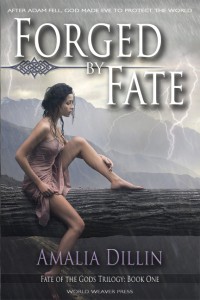Writer's Grove
For the Love of Thor
Kevin’s Note: Welcome Amalia Dillin to the blog with a guest post! Amalia is a mythology buff who’s let me bounce some ideas off her in the past, and she has a new book out today! Here we go—Amalia begins:
 If you read Forged by Fate, the first book in my Fate of the Gods trilogy, you’ll realize pretty quickly that I *love* Thor. Not to say that the good and honorable Mr. Hearne does not! But our books definitely stand on different sides of the ThorLove fence.
If you read Forged by Fate, the first book in my Fate of the Gods trilogy, you’ll realize pretty quickly that I *love* Thor. Not to say that the good and honorable Mr. Hearne does not! But our books definitely stand on different sides of the ThorLove fence.
Now, my interpretation of Thor isn’t exactly in line with the Eddas – he’s smarter for one thing – but when it comes to the heart of his character, even in the myths, Thor is loyal, almost to a fault.
In the myths, Thor trusts Loki, and lets him lead him around by the nose when it comes to adventuring in the East. He even gets dressed up as a woman and pretends to be Freya, sent to marry a giant in exchange for his hammer, because Loki assures him it will bring success. Thor defends the gods in Asgard from the Frost Giants, even when they’re in the wrong, even killing the aggrieved party, when necessary – and it seems, it is *often* necessary. And no matter how many times Loki betrays him, or leads him into trouble, Thor is still willing to give him the benefit of the doubt. No matter how many times Odin uses him to enforce the rights of the Aesir (in a flagrant abuse of justice), Thor does not fail to rise to Asgard’s defense.
It might be argued that most of this is because he’s rather slow on the uptake. Maybe he doesn’t put the pieces together the way a brighter god might. Or maybe he just looks at things from a more simplistic perspective: Aesir good, Jotuns bad. Maybe he just likes a good fight, and as such, he overlooks Loki’s betrayals, because the Trickster is providing him with the entertainment he wants – and the same with his father, Odin. Then again, maybe he *does* see what’s happening, and maybe, just maybe, as the pieces fall into place, he’s starting to realize he doesn’t like it.
In the myths, there’s a defining moment where we see the gods finally turn against Loki: the death of Baldur. Loki could fix the mess he made, held in his power the return of Baldur to life, but because Loki is a Trickster, undependable in the best of circumstances, he betrays Odin and the Aesir, and dooms Baldur to death. It’s a wrong that none of the Aesir can forgive. But even before that, there are moments when Thor’s patience with Loki slips. In one story, Thor allows the dwarves to sew Loki’s lips closed after the Trickster tricks them out of the prize of his head, after all. And in another myth, when Thor is told that Loki is leading him to his death at the hands of a giant, Thor believes the warning, and takes action for his own defense, regarding Loki with suspicion.
There are a lot of ways to interpret Thor’s character, when you’re reading the myths – Kevin’s use of him as a brute enforcer in IDC isn’t far from the mark in some circumstances – but if you love Thor, like I do, you might give Forged by Fate a read!
***
After Adam fell, God made Eve to protect the world. — Adam has pursued Eve since the dawn of creation, intent on using her power to create a new world and make himself its God. Throughout history, Eve has thwarted him, determined to protect the world and all of creation. Unknown to her, the Norse god Thor has been sent by the Council of Gods to keep her from Adam’s influence, and more, to protect the interests of the gods themselves. But this time, Adam is after something more than just Eve’s power — he desires her too, body and soul, even if it means the destruction of the world. Eve cannot allow it, but as one generation melds into the next, she begins to wonder if Adam might be a man she could love.

